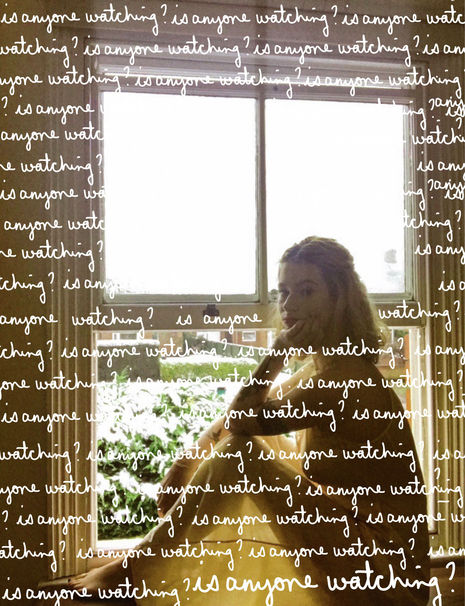You think, therefore I am
Columnist Jesi Bailey reflects on the construction of her identity and the nature of the self

I have spent a lot of time wondering why I cringe at any evidence of my youth, simultaneously fascinated and deeply embarrassed by old photographs or diary entries. There was always something about reflecting on my younger self that made me uneasy; an intense point of discomfort that couldn’t be explained by simple self-consciousness.
“I learned to curate my identity, to constantly shuffle through aspects of myself”
Knowing what I do now, the answer seems obvious: to remember who I was as a child is to acknowledge that there was a time when I existed without calculation or censorship, when I unashamedly chronicled a life compiled of reckless eagerness and honesty. To reflect on this is to confront the fact that, at some point in the time since, this ceased to be true. Instead, I learned to curate my identity, to constantly shuffle through aspects of myself, to create a person who could be needed and loved and safe, always. I started performing – and I haven’t been able to stop.
There’s no way to explain this wherein I come across well. I suppose that’s the trouble of it all, really – for years, I trod carefully around everyone I met, tracing around the edges to find a gap they needed someone to fill. I built myself into the cracks of people, desperately trying to see who they wanted and doing my best to fit the role. I fudged my resume for whatever job was going. I would be reckless if they needed something exciting to watch, funny if they needed a laugh, a listening ear for those who held too much inside themselves. I constructed myself until I was only a character in everyone else’s lives, keeping score of what exactly my value was in any relationship and ensuring I was always providing enough of what they wanted. It never felt like a lie – more like a precise laying out of things about me which were all authentic in some capacity, but couldn’t be trusted to be palatable without monitoring.
It was a system with inevitable consequences: in order to tailor myself to the assumed preferences of those around me, I ceased to believe that I could matter in my entirety. I created a catalogue of everything that constituted myself and then decided which parts could be seen and still loved. Thus began the never-ending bookkeeping still present in my mind; the constant recording of how much I had revealed to any given person and how much closer to the truth I could afford to get. Soon, it became impossible to exist in any way without someone present to set the standard for who I should be. It became impossible to both be a person, and be alone.
“I watched myself from the outside once more, the end-result of years of curation”
Until, of course, I had to be alone. A year of social isolation is a dangerous thing for a girl who believes that she only matters when other people are looking at her. It felt as if someone had turned the lights off without warning. I was suddenly left with no way to know who I was if I couldn’t watch myself through others’ eyes. Autopilot kept me moving for as long as possible; organising video calls and sending quippy texts to the people I loved, as if to convince the both of us that I was still a sound investment in their lives, that I could still give them what they needed. And, in the slowly-increasing stretches between these interactions, I haunted my own house, knocking things over in pitch-dark rooms simply to prove I was real. I lay cocooned in bedsheets for days at a time, waiting to be granted the attention which would permit me to be a person again. I watched myself from the outside once more, the end result of years of curation, and I pitied the obvious emptiness of this girl - it terrified me.
The pattern of chameleonic performance which had defined years of my life was suddenly impossible to unsee. The realisation of just how deeply I lacked any true sense of self rocked me. I felt paralysed, entirely clueless about how to dismantle what felt like a lifetime of self-construction. Even the thought of sharing these feelings seemed horrifying: how could I admit to the people I cared about most that I had been subconsciously working off the assumption that exercising extreme caution was the only way to ensure they kept loving me? How could I apologise, to myself and to them, for that betrayal of under-estimation? And perhaps the most pressing question of all: how could I begin to know the right step to take?

Why an Atheist started streaming church in a pandemic
It seems to me that the truest answer is also the most difficult: the right step to take is simply the next one. I could only begin to move, in any direction I could find, until it felt like I could breathe again. Even if that meant walking in the dark. Most of the time, it still means walking in the dark, stepping out with lanterns and searching for what it is about me that feels true. It’s imperfect progress, and slow – I still seem to be finding far more evidence of what I am not than what I am, and even less of how that all came to be.
I don’t know when I stopped being myself, or when I started believing that to do so wouldn’t be good enough for anyone. But I’d like to think I’m learning, day by day. I’m speaking out loud the hopes which were once too terrifying to even consider, and I make myself repeat them as if they were unshakeable truths. There is a world where I live my life, rather than witnessing it. There are parts of myself that can be loved without calculation. And I am working very hard to believe it.
 News / Right-wing billionaire Peter Thiel gives ‘antichrist’ lecture in Cambridge6 February 2026
News / Right-wing billionaire Peter Thiel gives ‘antichrist’ lecture in Cambridge6 February 2026 Features / From fresher to finalist: how have you evolved at Cambridge?10 February 2026
Features / From fresher to finalist: how have you evolved at Cambridge?10 February 2026 Film & TV / Remembering Rob Reiner 11 February 2026
Film & TV / Remembering Rob Reiner 11 February 2026 News / Churchill plans for new Archives Centre building10 February 2026
News / Churchill plans for new Archives Centre building10 February 2026 News / Epstein contacted Cambridge academics about research funding6 February 2026
News / Epstein contacted Cambridge academics about research funding6 February 2026









